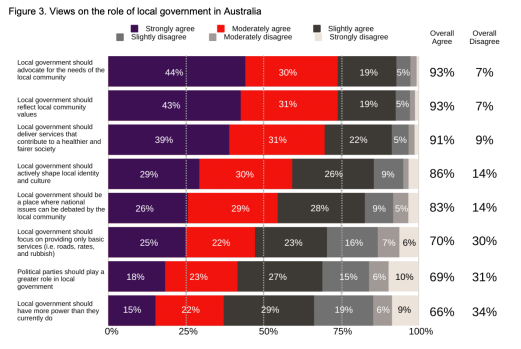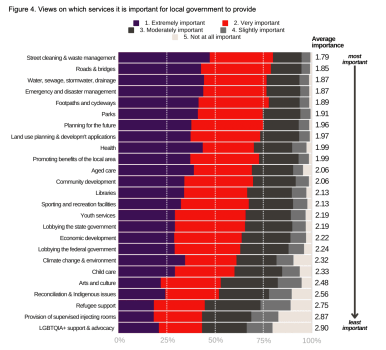
The public wants a wider role for local government than just providing basic services, but remains divided about whether councils should wade into contentious areas like LGBTQIA advocacy and the Australia Day debate.

A survey of more than 1,300 Australians shows most people think local government should continue to focus on traditional services like roads and rubbish.
But it also revealed there’s significant support for councils to play a role in areas like climate action, fostering debate on national issues and shaping community identity.
Researchers from the Australian Catholic University and ANU asked 1,350 Australians over June and July last year what they thought the role of local government should be.
Seventy per cent said local government should stick to what it has traditionally done – roads, rates and rubbish.
However, nine in ten respondents said councils should play a role in advocating for the community, reflecting community values and delivering services that contribute to a fairer and healthier society, lead researcher Associate Professor of Politics at the ACU Research Centre for Social and Political Change Mark Chou said.
“All those things suggest that a much greater realm of responsibility and roles than just tackling the traditional services,” Professor Chou told Government News.
“So while support for local government sticking to the three Rs remains strong, almost as many, 66 per cent, thought that local government should have more power than they currently do.
“What we can read from this is that there is growing support among the public for councils to have a more expansive role.”

Street cleaning, waste management seen as top priority
The results show that street cleaning, waste management, roads and water are considered the most important local government services, followed by disaster management, footpaths and cycleways, and parks.
Child care, arts and culture, indigenous issues, refugee and injecting rooms were in the bottom six, with LGBTQIA+ support and advocacy coming last.
About a third of respondents didn’t believe local governments should engage in LGBTQIA+ advocacy and almost half said they didn’t think councils should be flying the rainbow flag.
The role of councils in changing the date of Australia day was another polarising area.
While more than three quarters of respondents said councils should recognise Indigenous perspectives and advance reconciliation on Australia’s national day, half said councils shouldn’t weigh into debates about changing the date from January 26, with nearly one in three ‘strongly’ disagreeing.

Three quarters of respondents agreed that local government should be engaged in climate related issues and 86 per cent saw a role for councils in shaping local community identity.
Eighty-six saw local government as a place for the local community to discuss national issues and three quarters agreed councils should be involved in climate-related activities.
Sixty-six per cent of respondents said local governments should have more power than they currently do.
Impact of Covid
Professor Chou says not only are a growing number of councils across Australia seeing their roles in a different light, but a shift is occurring in the way local government is viewed by other levels of government.
This was to an extent driven by Covid lockdowns, he says, where communities were confined to their LGAs and often forced to rely on council services and support.
“Lockdown meant overstretched state and commonwealth governments had to give greater responsibilities to local government,” he says.
“They’re no longer confined to just being an administrative arm of higher levels of government. They are a place where serious decision making takes place in its own right.”
Resourcing
He says this has also raised question about resourcing the local government sector.
“They’re being asked to do more, and community sentiment seems to suggest that they should be doing more, but they’re not actually getting more funding to do that,” he says.
Professor Chou believes the role of local government will continue to evolve as councils take on nationally divisive issues like gender identity, climate change, affordable housing, pill testing, Indigenous reconciliation, and national identity and history.
“Although true that Australian local governments have a long history of championing certain progressive political causes, from women’s political franchise to the anti-uranium and nuclear power movement, never before have so many local councils engaged and shifted national debate by tackling issues well beyond their traditional remit as in recent years,” he writes in his report.
Comment below to have your say on this story.
If you have a news story or tip-off, get in touch at editorial@governmentnews.com.au.
Sign up to the Government News newsletter